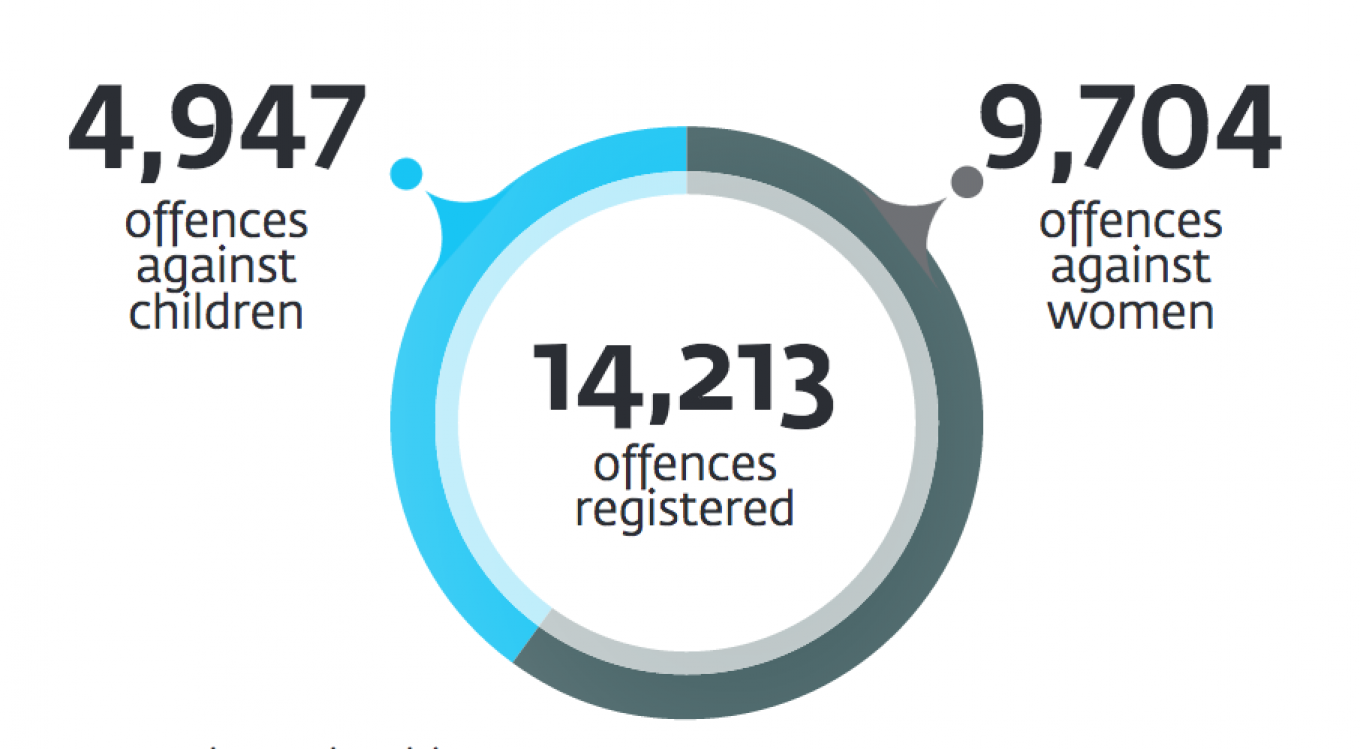Nina grabbed the nearest thing — a metal bar — she could find to defend herself.
For years, she’d been the victim of abuse by her husband, Maxim. She’d been strangled and beaten — even when she was pregnant. She had left him, divorced him, and even moved to another city with her newborn daughter and mother. But Maxim followed her, tried to break into her new apartment and even attempted to kidnap their daughter.
Now he was attacking both her and her elderly mother. Сalls to the police resulted in nothing, so she turned to the metal bar. And when the metal bar failed to stop him, she pulled out pepper spray. He left, and she went to the police.
Two weeks later, Nina discovered that the authorities had opened a criminal case. Only it was not against Maxim, but against her — over the minor injuries her ex-husband sustained. Now Nina was the one who was facing time in prison for domestic violence.
Nina’s story may be extreme, but it is not unique. Law enforcement in Russia does little to protect women from domestic abuse. And when these women resort to self-defense, the police usually side with the men.
Russia is “forcing women to choose between prison and the grave,” says Mari Davtyan, a lawyer who defends victims of domestic abuse.
Catch 22
According to official statistics, in the first nine months of 2016, law enforcement registered 9,704 cases of women suffering from “simple battery” (assault that doesn’t result in substantial bodily harm).
Combined with more significant levels of harm, there are tens of thousands of women suffering from domestic abuse each year. Many die from their injuries and some women are murdered.
Large numbers of women are prosecuted for fighting back. In 2016, 6,916 criminal cases were opened against women for “knowingly inflicting light bodily harm” on other people, according to data from Russia’s Interior Ministry provided to The Moscow Times. Not all of them are in self-defense, but a large proportion are.
What’s more, Russia decriminalized simple battery carried out by family members this year. The decision is unlikely to improve matters.
The implications remain uncertain. But decriminalization signals to many that the authorities don’t consider domestic violence serious. It’s little surprise that few women turn to the police after their partners attack them.
“Seventy percent of women that call our hotline say they have never sought help from law enforcement,” says Andrei Sinelnikov, deputy head of the Anna Center, an NGO helping victims of domestic violence.
Even when they do seek help, police officers don’t live up to their responsibilities. One egregious example of police indifference appeared on tape in November 2016 and was widely reported by the media. The 36-year-old victim, Yana Savchuk, was a resident of Oryol, 200 miles south of Moscow. After an attack by her ex-boyfriend, Savchuck called the police, fearing for her life.
“Don’t call us again, we won’t come!” said the officer at the scene. She was later identified as Natalya Bashkatova, the award-winning “best beat policewoman in Oryol.”
“What do you mean you won’t come? What if something [bad] happens and I call you, you won’t come?” Savchuk asks, outraged.
“If he kills you, we will come and report the corpse, don’t worry, ” Bashkatova responds.
A day later Savchuk, hospitalized with severe injuries, died.
The Silver Lining of Decriminalization
Police officers themselves offer a different perspective on the issue. Beat policemen usually stay out of family matters when possible, Mikhail Pashkin, chair of the Police Union, told The Moscow Times. “They know that, in two days time, the woman will withdraw her complaint, so why bother?” he said.
Officers polled by The Moscow Times confirmed that the majority of women withdraw their complaints. Others “reconcile” with their attackers instead of bringing the case forward.
“Usually women call the police to scare their partners. They are not ready for a serious legal fight. Most cases settle ‘upon reconciliation of parties,’” a beat policeman told The Moscow Times on condition of anonymity.
Another anonymous officer said she filed thousands of domestic violence complaints over 15 years.
“Do you know how many of them resulted in trials and verdicts? Five,” she said.
But lawyer Davtyan argues that withdrawing complaints is not a legal procedure. Once a complaint is filed and properly registered, it can’t be rescinded, and a probe must be opened. Police officers allowing women to rescind complaints three days after filing are neglecting their duties. “They simply don’t register complaints, and instead sit around waiting for women to come and withdraw,” she says.
The solution is simple: “Police officers should start fulfilling their duties,” says Davtyan.
Decriminalizing domestic violence has improved matters, some officers argue. Now that familial battery is an administrative offense, there can be no “reconciliation of parties,” they say.
“If we get a call and go to the scene, we put together a report that goes to court anyway, no matter how much the woman wants to stop it [later on],” a beat policeman told The Moscow Times on condition of anonymity.
Davtyan accepts this, but argues developments make life easier for the police, not victims. Officer performance ratings focus on cases they personally launch and close. Responding to domestic abuse calls when it was a criminal offence did not benefit them, because they were not empowered to open criminal cases.
“Now they can open administrative cases and get better statistics,” Davtyan says. This, she believes, is why they feel more enthusiastic about decriminalization.
But what’s in it for the victim? In the best case scenario, the abuser will get a fine, which he will pay out of the family budget. “They might even arrest him — but only for two or three hours — and then he comes back home even angrier,” Davtyan says.

Self-Defense
Without police support, desperate women trapped at home take charge and defend themselves.
Natalya Tunikova’s expected to die when her husband Dmitry dragged her to the balcony. Her apartment was on the 16th floor, so surviving the fall was out of the question. She tried to hold on to the kitchen table and accidentally grabbed a knife while fighting her attacker off. She cut him in the process.
Dmitry called an ambulance and doctors called the police, who arrested the bruised and shocked Natalya. The suit she brought against her husband for beating her was dismissed. Dmitry healed and went to Turkey on vacation soon after the incident. But Natalya faces up to 8 years in prison.
There are ways of inflicting minimal harm on an attacker while defending yourself. But in life-threatening situations, this isn’t a priority, says Natalya Mastyukova, a coach at the White Lynx self-defense club for women. “When it’s life or death, what do you think a person would choose? Someone’s broken ribs or their life?” she says.
In her experience, women tend not to fight — they pity their attackers and fear harming them. That is the first thing Mastyukova teaches women to overcome. “Your attacker won’t pity you or wait until you work up the courage to fight back,” she says. “So you need to be as aggressive as possible.”
Self-defense classes for women are gaining in popularity, says Mastyukova. But few victims of domestic abuse take them. It is never those who need it most. Women who live with abusers and live in fear rarely take part.
“We had a few phone calls from women who live with abusive relatives, but they never showed up,” Mastyukova says. “I got the impression their abusers control their lives.”
A Message from The Moscow Times:
Dear readers,
We are facing unprecedented challenges. Russia's Prosecutor General's Office has designated The Moscow Times as an "undesirable" organization, criminalizing our work and putting our staff at risk of prosecution. This follows our earlier unjust labeling as a "foreign agent."
These actions are direct attempts to silence independent journalism in Russia. The authorities claim our work "discredits the decisions of the Russian leadership." We see things differently: we strive to provide accurate, unbiased reporting on Russia.
We, the journalists of The Moscow Times, refuse to be silenced. But to continue our work, we need your help.
Your support, no matter how small, makes a world of difference. If you can, please support us monthly starting from just $2. It's quick to set up, and every contribution makes a significant impact.
By supporting The Moscow Times, you're defending open, independent journalism in the face of repression. Thank you for standing with us.
Remind me later.






